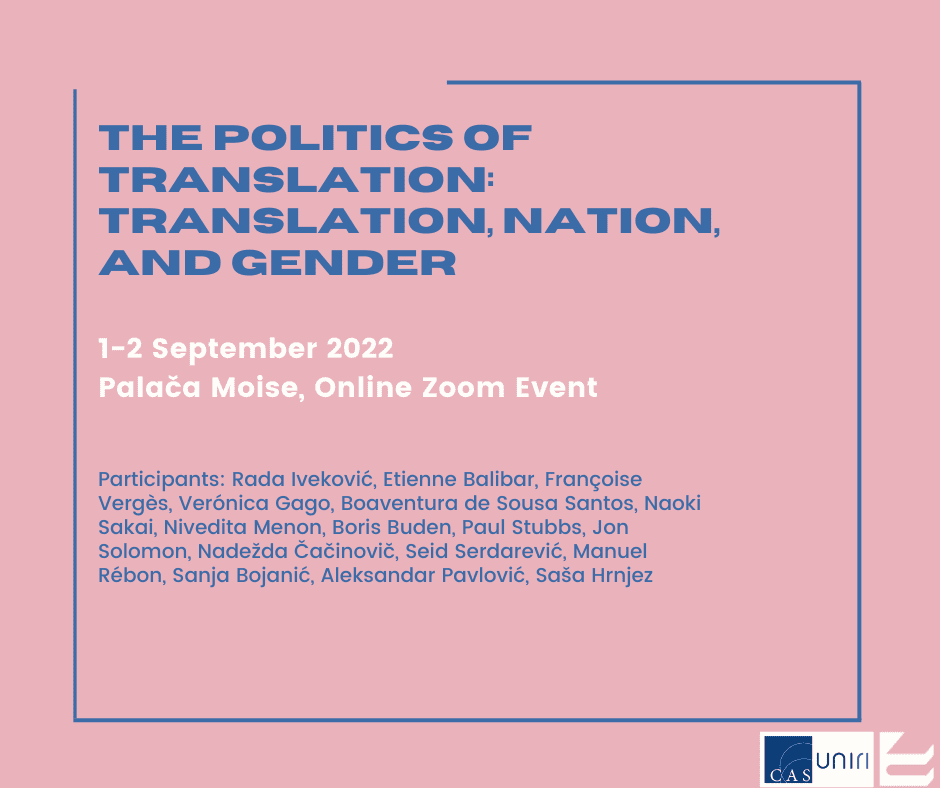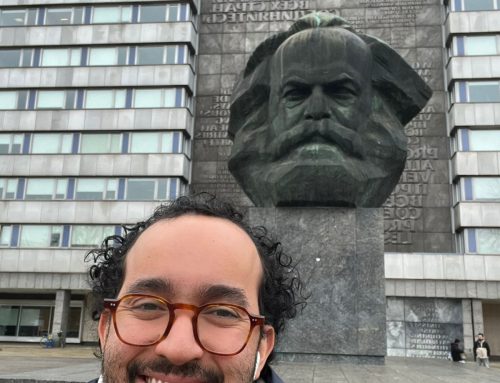In organization with University of Rijeka, Center for Advanced Studies Southeast Europe, and University of Belgrade, Institute for Philosophy and Social Theory in Belgrade
Translation is political because it is a relation, a context of negotiating power. It also dictates an epistemological approach. It invites a complex analysis of gender, class, race, or national and other hierarchies’ relations and their intersection. It is the opportunity for transformation, for becoming-other (devenir autre, Deleuze and Guattari), although the political quality of that devenir is never guaranteed. As the occasion for a metamorphosis, translation is what Etienne Balibar now calls communism, since the conservative revolution that shattered (also) our knowledge system. As a praxis of theory or as political activism, when aiming at changes in society or in the state, translation may have to deal with violence. The presupposition is that, within plural and diverse knowledges, there is no definitive knowledge, but only temporary proposals of consecutive understandings. The concept of reciprocally incomplete knowledges (Boaventura de Sousa Santos) comes as useful here. Any war is a situation of the collapse of (peaceful and acceptable) translation. Bad translation, violence and war can also be seen as forms of translation, as translation remains undefined in itself. As far as Europe is concerned (but the same pattern appears elsewhere too), the field of a most striking crisis in translating has recently been not only the current war in Ukraine, but above all the previous systemic rejection of refugees and migrants (except for Ukrainians, so far).
Verónica Gago shows how the political space of struggles has spilled across borders and across political issues through the green tide of feminist activism in Argentina and elsewhere, starting from the struggle for the right to abortion rendered political by the mass movement: “The reticence (and incapacity) of many people to discuss abortion in political terms […] demonstrates the political centrality of abortion. […] Whenever abortion is spoken about, it is also labor that is being spoken about.” The demand translated women’s concerns into universal questions, but translated also – by enlarging them – old labour concepts (such as ‘strike’) thanks to a feminist approach. The recent feminist tide in Latin America as well as its theorisation has been impressive.Linking gender and nation is a necessary feature of translation studies. The vocabulary of nation and nationality is directly derived from gender stereotypes and the capacity of birth giving of some humans. All language of inequality is imbedded in basic gender discrimination, as the oldest and most consensual dogma of patriarchy and coloniality. Naoki Sakai has been critically analysing the building of the modern colonial Japanese nation, which relies on cultural, gender, and ethnic politics to inculcate foundational national and gender inequality through a politics of transnational relations as cultural translational transactions.

Our conceptual apparatus ordaining knowledge is isomorphic with our social organisation and hierarchies. The double front of gender is apparent. The universalisation of a nationalist paradigm is only its narcissistic over-inflation and provincialisation. Everything else is rendered illegitimate and erased from mainstream consensus. It becomes “useless history”. Social and state inertia tend to include women as subordinate, and to exclude or marginalise categories of “outsiders”. There is an infinite variety of such patterns and capacity of coloniality-patriarchy-capitalism, as a complex (Silvia Federici), to adapt and keep going, also with the help of nationalism. Questions that the speakers may address include these and other related issues.
With Rada Iveković, Etienne Balibar, Françoise Vergès, Verónica Gago, Boaventura de Sousa Santos, Naoki Sakai, Nivedita Menon, Boris Buden, Paul Stubbs, Jon Solomon, Nadežda Čačinovič, Seid Serdarević, Manuel Rébon, Sanja Bojanić, Aleksandar Pavlović, Saša Hrnjez.
*Rada Iveković’s book Politiques de la traduction. Exercices de partage (http://www.reseau- terra.eu/article1426.html) has been translated in Zagreb as Politike prevođenja (Fraktura), and in Buenos Aires as Políticas de la traducción. Ejercicios del com-partir (Ubu Ediciones). It is not the subject of the conference but, its occasion.
You can find the program here: Politics of Translation2022_Programme
UNIRI The Moise Palace: Cres Island
An education center of the University of Rijeka. A five-hundred-year-old patrician townhouse and the largest Renaissance palace on the Croatian islands. A venue and forum for various scientific and research activities, it welcomes visiting academics, students and scholars.




